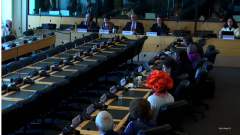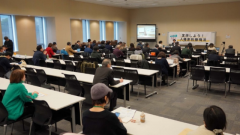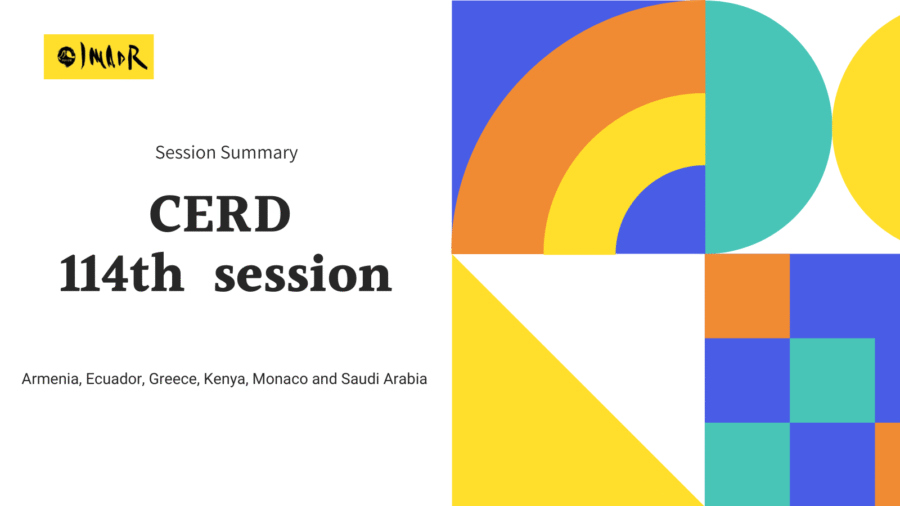CERD 107th session summary: Azerbaijan, Benin, Nicaragua, Slovakia, Suriname, United States of America, Zimbabwe
September 6, 2022
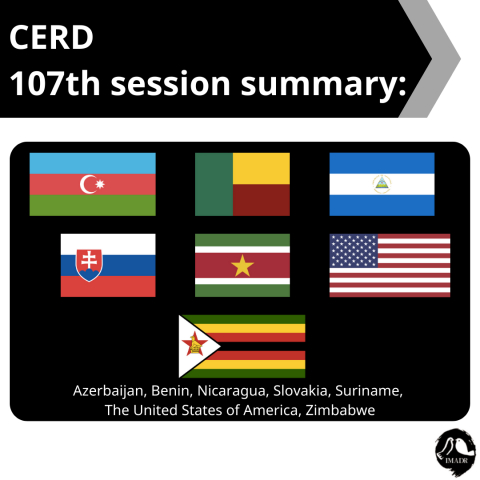
From 8th to 30th August 2022, the UN Committee on the Elimination of Racial Discrimination (CERD) held its 107th session. At this session, the Committee reviewed and adopted concluding observations on Azerbaijan, Benin, Nicaragua, Slovakia, Suriname, United States of America, and Zimbabwe.
In accordance with its follow-up procedure, the Committee did not issue any follow-up letters.
The Committee sent letters to Australia, Brazil, Canada, and Colombia under its Early Warning and Urgent Action procedure. The Committee also released a statement on the tragic events at the Moroccan-Spanish border.
Furthermore, on 23 August 2022, the Committee held its Day of General Discussion on racial discrimination and right to health. The inputs gathered from different stakeholders will support the draft of the General Recommendation N° 37 on racial discrimination and the right to health under Article 5 (e)(iv) of the Convention.
Concluding observations, reports of the States parties and other stakeholders are available at the OHCHR website. Video archives of the public meetings can be accessed at UN Web TV.

Azerbaijan
The interactive dialogue with the State of Azerbaijan took place on 15 and 16 August 2022. The State report was timely received by the Committee in July 2019. The Delegation was headed by H.E. Mr. Elnur Mammadov, Deputy Minister of Foreign Affairs of Azerbaijan. The Country Rapporteur, in charge of leading the review of Azerbaijan, was Ms. Chinsung Chung. To assist her, Ms. Stamaria Stavrinaki was the co-Rapporteur.
The dialogue was marked by an overall openness of the State of Azerbaijan to provide data and updates on the situation on the ground, and committed to provide further information. By the end of the dialogue, the Country Rapporteur called the State to continue the promotion of multiculturalism in the country and to address the issues of racial discrimination in the Karabakh region.
In its concluding observations, the Committee issued recommendations on the following topics (Recommendations with asterisks [*] are the ones selected for the Committee’s follow-up procedure):
- Application of the Convention in the context of the 2020 hostilities and beyond;
- Statistics;
- Convention in the domestic legal order;
- Definition of racial discrimination;
- Special measures to address inequalities;
- National human rights institution;
- Complaints of racial discrimination;
- Racist hate speech and hate crime*;
- Civil society organisations;
- Freedom of expression*;
- Minorities in political and public affairs;
- Languages of ethnic minorities;
- Situation of Roma and Dom communities;
- Refugees, asylum-seekers and stateless persons*;
- Migrant workers; and
- Training, education and other measures to combat prejudice and intolerance.
Azerbaijan is requested to submit its follow-up report by April 2023 and its next periodic report (combined 13th-14th) by 15 September 2025.

Benin
On 9 and 10 August 2022, the CERD Committee held an interactive dialogue with the State delegation of Benin for the first time. The initial State report was due in 2002 and was finally received by the Committee in October 2020. The delegation attended in-person and was headed by H.E. Mr. Séverin Maxime Quenum, Minister of Justice and Legislation. The Country Rapporteur, in charge of leading the review of Benin, was Mr. Bakari Sidiki Diaby. To assist him, Ms. Mazalo Tebbie was the co-Rapporteur.
Considering that it is the first review of Benin, the Follow-Up Rapporteur, Mr. Gun Kut, had no previous basis for an assessment and explained the procedure to the State delegation. It was followed by the rounds of questions and answers, in which the State was overall open and responsive and provided more information on the situation on the ground in several matters (e.g., statistics, non-nationals, legislation against discrimination, awareness-raising, and more), while committing to share further clarifications after the dialogue.
In its concluding observations (original text in French), the Committee issued recommendations on the following topics (Recommendations with asterisks [*] are the ones selected for the Committee’s follow-up procedure):
- Statistics;
- Definition of racial discrimination;
- Convention in the domestic legal order*;
- National human rights institution;
- Complaints of racial discrimination;
- Racist hate speech and hate crime*;
- National Action Plan against racism, racial discrimination, xenophobia and intolerance*;
- Access to justice;
- Situation of indigenous peoples;
- Transmission of nationality*;
- Stateless persons;
- Asylum-seekers and refugees;
- Persons with albinism;
- Human trafficking;
- Linguistic policy; and
- Education on human rights and on the memory of the transatlantic slave trade.
Benin is requested to submit its follow-up report by August 2023 and its next periodic report (combined 10th-13th) by 30 November 2026
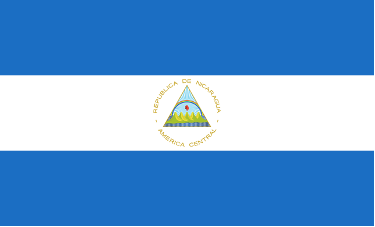
Nicaragua
Nicaragua had the interactive dialogue with the Committee scheduled for 10 and 11 August 2022. The report was due in 2011 and was received only in May 2019. However, the State delegation was not present, which was noted with strong concern by the CERD members. Nonetheless, during the scheduled first part of the dialogue, the Country Rapporteur, Mr. Eduardo Vega Luna, proceeded with an overview of Nicaragua based on desk research and information received by other stakeholders.
The Follow-Up Rapporteur, Mr. Gun Kut, noted that the State did not submit its follow-up report. Mr. Vega Luna added that the assessment of implementation of the previous recommendations for follow-up will be carried out despite the lack of the State’s participation. Finally, the Committee members stated their questions and in consensus regretted the lack of transparency and engagement of the State of Nicaragua.
In its concluding observations (original version in Spanish), the Committee issued recommendations on the following topics (Recommendations with asterisks [*] are the ones selected for the Committee’s follow-up procedure):
- Cooperation on human rights;
- Application of the Convention;
- Statistics;
- Legislative framework;
- Institutional framework against racial discrimination;
- Structural discrimination;
- Access to land;
- Attacks against indigenous peoples and Afro-descendants*;
- Previous consultation;
- Impact of natural resources exploitation;
- Excessive use of force*;
- Access to justice and discrimination in the judicial system;
- Law on autonomy and political participation of indigenous peoples and Afro-descendants*;
- Right to health;
- Impact of Covid-19 and hurricanes Eta and Iota;
- Right to education; and
- Situation of indigenous and Afro-descendant women.
Nicaragua is requested to submit its follow-up report by August 2023 and its next periodic report (combined 22nd-28th) by 17 March 2025.

Slovakia
On 16 and 17 August 2022, the CERD Committee held an interactive dialogue with the State delegation of Slovakia. The State report was timely received and the delegation was headed by H.E. Mr. Dušan Matulay. The review counted with the in-person attendance of the delegation, as well as with representatives in Bratislava via video link.
The review was led by Ms. Sheikha Abdulla Ali Al-Misnad, the Country Rapporteur, with the assistance of Ms. Stamaria Stavrinaki as the Co-Rapporteur. The Follow-up Rapporteur, Mr. Gun Kut, regretted the lack of follow-up report to assess the implementation of the recommendations highlighted in the previous review cycle. He took the opportunity of the dialogue to call on the State to provide further information on the issues selected. In cooperation with the Committee, the State had the opportunity to reply questions on several matters and committed to provide additional information soon after the dialogue.
In its concluding observations, the Committee issued recommendations on the following topics (Recommendations with asterisks [*] are the ones selected for the Committee’s follow-up procedure):
- Implementation of the Anti-Discrimination Act;
- The Slovak National Centre for Human Rights*;
- Special measures;
- Racist hate speech and hate crimes;
- Racist hate speech;
- Excessive use of force and racial profiling;
- Political participation of ethnic minorities;
- Refugees and asylum-seekers;
- Right to housing;
- Right to health;
- Forced sterilisation*;
- Right to education; and
- Civil society participation.
Slovakia is requested to submit its follow-up report by August 2023 and its next periodic report (14th) by 28 May 2025.
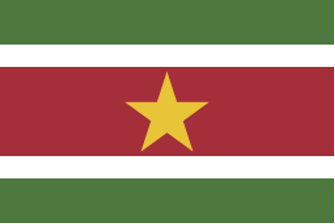
Suriname
The interactive dialogue with Suriname took place on 18 and 19 August 2022. The State report was timely received by the Committee in November 2019. The delegation attended in-person and virtually from Paramaribo, and was headed by H.E. Mr. Kennth Amoksi, Minister of Justice and Police. It counted with a strong representation of women, which was positively noted by some members of the Committee.
In charge of leading the review of Suriname, the Country Rapporteur was Mr. Michał Balcerzak. The Follow-up Rapporteur, Mr. Gun Kut, regretted the non-submission of an interim report by Suriname, although the State took measures to implement the recommendations. Out of three, two were fully implemented, namely the establishment of the Constitutional Court and a national human rights institution. Regarding environmental issues, he assessed that the State also adopted important steps, including the ratification of the Minamata Convention on Mercury. Throughout the dialogue, the State provided detailed information in reply to the questions of the Committee and committed to provide further information.
In its concluding observations, the Committee issued recommendations on the following topics (Recommendations with asterisks [*] are the ones selected for the Committee’s follow-up procedure):
- Civil society involvement;
- Statistics;
- Prohibition of racial discrimination;
- Structural discrimination;
- National Human Rights Institution;
- Hate crimes and hate speech;
- Complaints of racial discrimination;
- Legislative framework on indigenous and tribal peoples*;
- Access to justice;
- Lands, territories and natural resources;
- Environmental contamination and its impact on health*;
- Judgements of the Inter-American Court of Human Rights;
- Situation of indigenous and tribal peoples in health and education;
- Migrants, asylum-seekers and refugees;
- Stateless persons*; and
- Combating human trafficking.
Suriname is requested to submit its follow-up report by August 2023 and its next periodic report (combined 19th-20th) by 14 April 2026.

United States of America
The United States of America had the interactive dialogue with the Committee scheduled for 11 and 12 August 2022. The report was due in 2017 and was only received in June 2021. Due to the large number of members of the State delegation and representatives from civil society organisations, the review took place in Room XX at the Palais des Nations. The State delegation attended in-person and was headed by H.E. Ms. Michèle Taylor.
The review was led by the Country Rapporteur, Ms. Faith Tlakula, and Mr. Mehrdad Payandeh and Mr. Ibrahima Guissé as part of the Country task force. Mr. Gun Kut, the Follow-up Rapporteur, assessed that the United States of America did not adequately implement the recommendations from the previous review cycle, namely on border control, immigration law, and the closure of the Guantanamo Bay detention facility. The dialogue continued with rounds of questions and answers on the current situation on the ground and was overall marked by an openness to provide information on the issues raised.
In its concluding observations, the Committee issued recommendations on the following topics (Recommendations with asterisks [*] are the ones selected for the Committee’s follow-up procedure):
- Convention in the domestic legal order;
- Special measures;
- Institutional framework and national action plan to combat racial discrimination;
- Racist hate crimes and hate speech;
- Gun violence;
- Racial profiling;
- Excessive use of force by law enforcement officials;
- Peaceful assembly;
- Voting rights;
- Criminal justice system and juvenile justice system;
- Impact of the COVID-19 pandemic;
- Education;
- Right to health;
- Maternal mortality and sexual and reproductive health*;
- Discrimination and segregation in housing;
- Homelessness;
- Right to food;
- Child welfare system;
- Environmental pollution and climate change;
- Violence against women;
- Indigenous peoples*;
- Migrants, refugees, asylum-seekers and stateless persons*;
- Access to legal aid;
- Redress for legacies of the past; and
- Education to combat racial discrimination.
The United States of America is requested to submit its follow-up report by August 2023 and its next periodic report (combined 13th-15th) by 20 November 2025.

Zimbabwe
On 17 and 18 August 2022, the CERD Committee held an interactive dialogue with the State delegation of Zimbabwe. The State report was due in 2000, but it was only received in June 2021. The delegation attended in-person was headed by Hon. Mr. Ziyambi, Minister of Justice, Legal and Parliamentary Affairs.
The Country Rapporteur in charge of leading the review of Benin was Ms. Gay McDougall, along with Mr. Yeung Sik Yuen (Country Task Force). Considering that in the previous review, the follow-up procedure was not in place, the Follow-Up Rapporteur, Mr. Gun Kut, had no basis to conduct an assessment, but introduced the procedure to the State delegation.
Despite the more than twenty-year delay, the dialogue was marked by the lack of detailed information and statistics from the State, which did not agree with some of the Committee’s recommendations on data collection and disaggregation. The Delegation also constantly contested the information received by the Committee from other stakeholders.
In its concluding observations, the Committee issued recommendations on the following topics (Recommendations with asterisks [*] are the ones selected for the Committee’s follow-up procedure):
- Statistics;
- Anti-discrimination legislation;
- Convention in the domestic legal order;
- National Human Rights Institution*;
- Racist hate crimes and hate speech;
- Civil society organisations;
- Gukurahundi atrocities;
- Political representation of ethno-linguistic minorities;
- Economic development;
- Land reform;
- Indigenous peoples;
- Education;
- Discrimination in the private sector;
- Domestic workers and the informal sector;
- Discrimination in foreign companies;
- Migrants;
- Citizenship;
- Lack of identity documents*;
- Refugees; and
- Access to justice.
Zimbabwe is requested to submit its follow-up report by August 2023 and its next periodic report (combined 12th-13th) by 12 June 2026.



